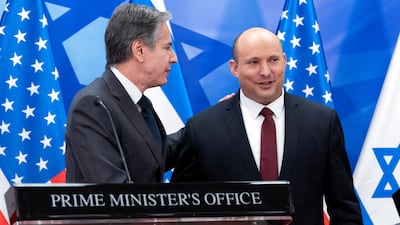The security of the Middle East is best served with Iran tied into a deal that ensures the country can never acquire nuclear weapons, the US Secretary of State has said.
Antony Blinken spoke on Sunday with foreign ministers from the UAE, Egypt, Morocco and Bahrain, on the the eve of a summit in Israel’s Negev desert.
He said that if Iran were to obtain a nuclear weapon it would face even fewer constraints on its actions in the region.
Mr Blinken said that Iranian attempts to destabilise the Middle East had intensified since former president Donald Trump pulled out of the 2015 Joint Comprehensive Plan of Action, which was meant to limit Tehran’s nuclear ambitions.
The Secretary of State cited Tehran’s support for Hamas and Hezbollah, and the rising number of drone and missile attacks carried out by the Iran-backed Houthi militia on targets in the Emirates and Saudi Arabia.
The Saudi-led coalition carried out a wave of air strikes in Yemen early on Sunday against targets in Sanaa and Hodeidah that it called “sources of threat” to the kingdom. It followed Houthi attacks against infrastructure in the kingdom including an Aramco oil depot near Jeddah on Friday.
A revived nuclear deal “is the best way to put Iran’s nuclear programme back in the box that it was in but has escaped from since the United States withdrew from that agreement” in 2018, Mr Blinken told reporters in Jerusalem.
“But whether there’s a JCPOA or not, our commitment to the core principle of Iran never acquiring a nuclear weapon is unwavering.”
Iran with a nuclear weapon “would become even more aggressive, and would believe it could act with a false sense of impunity”, he said, speaking alongside Israeli Foreign Minister Yair Lapid.
Mr Blinken was due to join his counterparts from Israel, Bahrain, Morocco, Egypt and the UAE for a special gathering at which the issue of Iran is expected to top the agenda.
EU and Iranian negotiators suggested at the weekend that a deal was close on reviving the agreement to lift sanctions that have caused shortages and economic hardship in return for verifiable limits on Tehran’s nuclear programme.
On Saturday, the EU’s foreign policy chief, Josep Borrell, said he believed a deal could be struck in “a matter of days”.
“Now we are very close to an agreement and I hope it will be possible,” he said.
Iran’s neighbours fear any relief from economic sanctions could embolden the regime to step up its attempts to destabilise the region through its proxies. Israel believes the deal does not include enough protection against Iran developing nuclear weapons.

